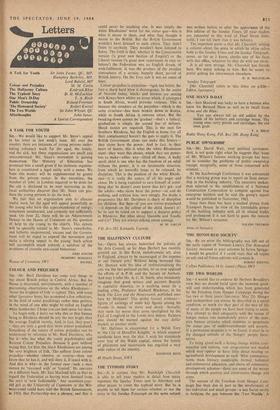COLOUR AND PREJUDICE
SIR.—Mr. Basil Davidson has some true things to say about British policy in Central Africa. But his theme is decorated, unfortunately, with a number of patronising observations on the white Rhodesians— 'never the brightest of folk' is typical. This, with some other Spectator items, has prompted a few reflections, in the field of social psychology rather than politics, in the mind of one who might be called an English white Southerner. I hope you can find space for them.
To begin with, I don't see why this or that human being in Rhodesia should be any the less bright than the average English variety. And, in fact, they aren't ---they are only a good deal more colour-prejudiced. Something of the nature of colour prejudice can be understood by reference to Mr. Basil Davidson, who has it—who has what the social psychologists call Reverse Colour Prejudice. Because it goes without saying that, for him, the black Rhodesians are among the very brightest of folk. The sufferer from colour prejudice—whether obverse or reverse—does not know that he has it, and will deny it, if taxed with it. And this is why—in the former case—such a man cannot be 'reasoned with' or 'trusted.' He operates on a different basis. Mr. fain Macleod tells us that to regard the Federation as having been doomed from the start is 'now fashionable.' Any seventeen-year- old girl at the University of Capetown or the Wit- watersrand could have told the British Governmen4, in 1953, that Partnership was a phoney, and that it could never be anything else. It was simply the white Rhodesians' word for the status quo—this is what it meant to them, and what they thought it meant to the British. But the British Government wouldn't have listened to such advice. They didn't listen to anybody. They wouldn't have listened to Solon. The truth is that, whether in the Conservative version Ca great new bastion of Empire') or the Liberal version ('a great new experiment in race re- lations) the Federation was an English dream, of wish-fulfilment. It was the product of the peculiar atmosphere of a certain, happily short, period of British history. On the Tory side it was an omen of Suez.
Colour prejudice is crystalline—rigid, but brittle. Be- fore a sharp hard blow it disintegrates. In the centre of Nairobi today, blacks and browns are mixing with Kenya-born whites on terms which. if attempted in South Africa, would provoke violence. This is because the structure of the prejudice—which is the same structure—has been broken down in Kenya, while in South Africa it remains intact. But the breaking-down cannot be `gradual'—that's a fallacy; gradualism is simply the second line of defence. Shock tactics are required. This is the cure for Southern Rhodesia, but the English at home (for all their complacency) haven't the guts to apply it. The British Government alone can make this history— they alone have the power. And in fact, in their heart of hearts, this is what the white Rhodesians want—they want this choice, which they are power- less to make—either way—lifted off them. A badly spoilt child is one who has the freedom of an adult without the power. It is an intolerable situation, from which he inwardly longs to be released, by discipline. This is the position of the white Rhode- sian—it is really the source of all his anger and abuse. He is being expected to cure himself of some- thing that he doesn't even know that he's got; and the adults—who alone have the power—sit and do nothing, and criticise him, very smugly. No doubt a progressive like Mr. Davidson is chary of discipline for children. But then—if you are colour-prejudiced —it depends on the colour of the child, doesn't it? So he can be relied on to support a decisive policy in Rhodesia. But what about Quoodle and Toodle and Co'? They are always talking about courage.
M. M. CARLIN






























 Previous page
Previous page